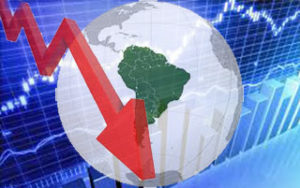South America and more specifically Brazil have attracted a lot of attention this year due to the Zika virus, corruption scandals, and electoral turnarounds and of course the Rio Olympics. But while the Olympic celebrations are set to begin, and South American countries are eager to show the prowess of their athletes, their economies are far from the podium finishes they were getting just a few years ago. Instead many countries are mired in recessions, fighting rising inflation and decreasing revenues from exports.
This is largely due to their dependence on raw materials, namely agricultural products, oil and industrial metals. South American economies had also become much more dependent on China as a result of the abundance of natural resources within their territories, and their traditional eagerness to find an alternative to demand from the US. Nevertheless this newfound partnership with China, together with the resurgence of socialist-oriented governments in some countries, generated a push towards over-dependence on raw materials and a subsequent bout of Dutch Disease which will be very hard to overcome.
The picture in South America is far from being homogeneous. On the one hand, there were countries which adopted a much more hardline socialist outlook, while others stuck to a more free market philosophy. On the other hand, it seems none of the countries in question invested enough in diversifying their economies while revenues from oil and industrial metal exports were high. This is why all of the economies in South America have been hit since the summer of 2014, and have very few hopes of recovering through avenues other than an increase in demand for raw materials that will help them regain some of their lost revenues.
So the South American economic Olympics begin with a race to the bottom. Going down in first place and well ahead of the pack, is Venezuela. The bastion of ‘21st century socialism’ is on the brink of total collapse, with inflation running at 481% according to IMF estimates and unemployment rates closing in on 20%. Besides the high rates of economic contraction, Venezuela could be running up to quadruple digit inflation, with IMF estimates putting the figure at a staggering 1,642% for 2017. This would be far from the world records seen in Hungary during 1946 or in Zimbabwe, but would still merit a gold medal in a race to the bottom of the barrel.
For second and third place, running down the economic downturn road, there is a close competition between Ecuador, Argentina and Brazil. All these countries have projected GDP contractions for 2016, and high rates of inflation. It would probably be unfair to consider Ecuador for this race, since it has dealt with natural calamity in the form of a devastating earthquake that has run its growth potential down even further. Brazil and Argentina are a whole different story.
Brazil, the host of the Rio Olympics, is headed towards an inflation rate of 9% this year, with a projected rate of GDP contraction of about 3.5%. Argentina is headed towards a whopping 41% inflation rate this year while shedding 1.5% of its GDP during 2016, despite unseating the socialist leaning government in recent elections. This makes the decision about who to award the silver and bronze medal to, a tough one. For the time being, it is quite obvious that the dubious privilege of getting a podium finish in this race, is bad enough. The kind of medal awarded will not provide consolation for the citizens of these badly managed, tragically impoverished countries.



